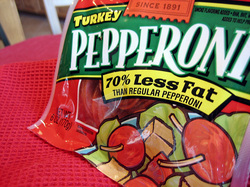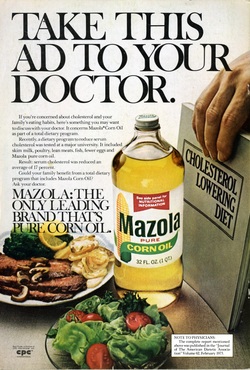The Low-Fat Myth:

The Framingham Heart Study contributed to the popularity of the lipid hypothesis, and is often cited as "proof" of its validity, but in actuality it ended up showing just the opposite. This study began in 1948, and involved 6,000 people divided into two groups, one consuming a low-fat, low-cholesterol diet, and the other consuming fairly high amounts of fats. These two groups were compared at 5 year intervals on a variety of health factors. At the end of 40 years, the director of this study admitted that, contrary to expectations, "In Framingham, Mass., the more saturated fat one ate, the more cholesterol one ate...the lower the person's serum cholesterol."
One thing the study actually did show was that people who weighed more and had higher blood cholesterol levels were slightly more at risk of developing heart disease; however, quite counter to the "common wisdom" on the topic, "weight gain and cholesterol levels had an inverse correlation with fat and cholesterol intake in the diet."* What this means, for the lay person, is that those who ate MORE fat and cholesterol, actually weighed less, and had lower blood cholesterol!
Nonetheless, over the years, more and more advocates of the low-fat myth jumped on board, but as explained in Sally Fallon's book, Nourishing Traditions, based on the extensive research of Dr. Weston Price, there is "very little evidence to support the contention that a diet low in cholesterol and saturated fat actually reduces death from heart disease or in any way increases one's lifespan."
In fact, before the 1920's, coronary heart disease was very rare in America - so rare that it was hard for researchers even to find test subjects for new medical technologies addressing the condition! Today, heart disease is attributed to at least 40 percent of all deaths in the United States.
Wouldn't it make sense that, if a diet high in saturated fats and animal fat causes heart disease, we would currently be eating more saturated fats than ever before in history? However, this is definitely not the case. In fact, since the introduction of the lipid hypothesis, the proportion of traditionally consumed animal fats in the American diet has declined by more than 50%, while dietary intake of vegetable and refined oils has increased 400%, and consumption of sugar and processed foods has increased about 60%.*
This trend alone should be enough to show anyone with common sense that we have been, as it were, barking up the wrong tree for the past 60+ years!
But if you want more proof, Fallon's book lists about a dozen studies - done in multiple countries throughout the world, and by such prestigious entities as the National Heart, Lung, and Blood Institute, and the Medical Research Council, and including the famous Lipid Research Clinics Coronary Primary Prevention Trial - a $150 million study often also used to support the lipid hypothesis - which actually did not even test dietary consumption of cholesterol and saturated fat, but instead was a test of a cholesterol-lowering drug!

Only about 20-30 years ago, 300 was considered a healthy blood cholesterol level. Since the advent of cholesterol-lowering drugs, the recommended level of blood cholesterol has declined to around 150 (I wonder why??). As you may guess after reading about cholesterol's many important functions below, too low levels can actually be quite dangerous to your health! Low cholesterol levels have been linked to depression, hormonal imbalances (and all the health problems that go along with them), increased risk of infection, violent behavior, suicide, and even cancer, just to name a few. Why? Read on to find out.
What Is Cholesterol?
Well, basically, it's your body's form of "spackle". :-) Or put in more dramatic terms by Health Alert author, Dr. Bruce West, "cholesterol is a type of fat that is essential to life." You actually only get about 1/4 of the cholesterol your body needs from your diet. It produces the rest by itself. Cholesterol is a high-molecular weight alcohol which is manufactured by most of the cells in your body, and it is primarily used to repair damage - damage to cell walls, arteries, blood vessels, etc., are all patched up with cholesterol.
Some other important functions that cholesterol performs include:
- Forms the main part of your cellular membranes and provides structure and stability to your cell walls
- Makes up the core of most of your hormones, and assists in performing their functions
- Helps the liver to produce bile, which digests your food, and aids in detoxification
- Works with Vitamin D to help maintain proper growth, metabolism, immune system function, and more
- Acts as an antioxidant to protect against free radical damage
- Assists brain function through maintaining normal serotonin levels (low cholesterol levels have actually been linked to serotonin deficiency, which can lead to depression, aggression and violent behavior, and suicidal tendencies)
- Maintains the health of intestinal walls (thus helping keep the immune system strong, reducing allergies, and much more)
"Just as a large police force is needed in a locality where crime occurs frequently, so cholesterol is needed in a poorly nourished body to protect the individual from a tendency to heart disease and cancer."
Blaming high cholesterol for heart disease is like blaming firemen for starting fires, just because you see firemen wherever there is a fire!
But this doesn't mean that all fat is good, or even that all dietary sources of cholesterol are good. As with any food we we eat, quality plays a large part in its healthfulness. With fats and oils, this is especially the case. With many types of fat, processing doesn't just destroy nutrients - it can actually change the molecular structure, causing the fat to become a harmful substance.
Next week, we will discuss the types of oils and fats you should avoid, and what kinds of fats you can (and should) eat instead.
Stay tuned!
In the meantime, for more on the low-fat myth, check out these resources:
Nourishing Traditions, by Sally Fallon & Mary Enig.
Low-Fat Lies, by Kevin Vigilante, MD, & Mary Flynn
The Great Cholesterol Myth, by Jonny Bowden & Stephen Sinatra
Ignore the Awkward: How the Cholesterol Myths Are Kept Alive, by Uffe Ravnskov



 RSS Feed
RSS Feed